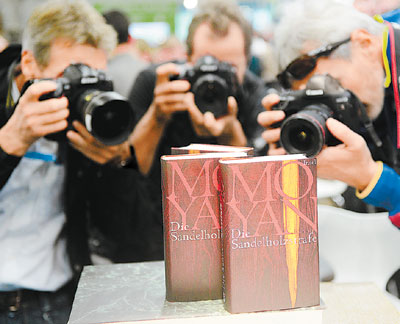|

HAILING Mo Yan as the first Chinese citizen to win the Nobel Prize in Literature, the public has started to contemplate ways in which to increase Chinese literature’s global influence.
Mo’s achievement suggests that contemporary Chinese authors and their works are starting to get the world’s attention, which is encouraging for writers, said Wang Meng, a renowned Chinese writer.
But “the prize has come rather late,” said Xue Yongwu, dean of the College of Liberal Arts, Journalism and Communication with Ocean University of China (OUC).
There have been many accomplished writers of modern and contemporary literature in China, including Lu Xun, Ba Jin and Mao Dun, who also should have won the prize, he noted.
“China’s ancient literature, which extends thousands of years, has been widely praised across the world. However, contemporary literature has had insufficient recognition due to its short history and obscure political influences, he explained.
Language has also been a barrier. Only a small proportion of Chinese literature has been translated. Most translations have been into English. The quality of some translated editions has been found wanting, said Xue.
In addition to language skills, translation requires high-level comprehension and interpretation of culture and art. It’s hard for people without literary background to produce a translation that fully conveys the aesthetic sense of the original version, according to Ren Dongsheng, professor with the College of Foreign Languages of OUC.
The 57-year-old writer is known for his depictions of Chinese rural life. The settings for his works range from the 1911 revolution, to Japan’s invasion in 1937 to the Cultural Revolution.
Mo combines hallucinatory realism with folk tales, which is more appealing to the taste of Western readers than the styles adopted by many of his peers, such as Yu Hua, Su Tong and Wang Shuo, said Zhang Hongsheng, dean of the Literature Department of the Communication University of China.
However, Xu Yan, a literary critic, urged his countrymen not to get carried away by Mo’s success, “The Nobel Prize is not the sole standard with which to judge the achievements of a writer. Prizes presented by different organizations adopt various evaluation criteria.”
The quality of a literary work is judged by the topic, language, structure, the storytelling techniques, and other significant elements. People’s tastes vary through different social and cultural backgrounds, she added.
Contemporary Chinese literature generally means that published since 1949. It has diversified considerably since the country adopted the market economy in 1992.
“The prize is a positive sign that the West has begun to recognize Chinese literature. But it’s an acknowledgement of individual efforts, and China’s literary revival still has a long way to go,” said Zhang.
Xue called upon Chinese writers to produce quality work with international perspectives. Good literature should reveal social problems and people’s concerns as well as being beautiful.
“Society should provide a favorable environment for the growth of Chinese writers,” he stressed.
Gaining international attention requires Chinese writers to be true to their origins, Zhang said.
China’s book market has witnessed booming sales of Mo’s masterpieces since his victory was announced.
Zhicheng Classic Bookstore, registered at T-Mall of China’s largest online retailer Taobao.com, said 1,500 volumes of Mo’s latest novel “Frog” were sold out in six hours after Mo won the prize. The store has received 1,200 reservation orders by 3:30 p.m. Friday.
The book, about China’s one-child policy, also moved up to 14th from 560th on the list of most popular books at Amazon.cn within two days.
Cao Yuanyong, deputy editor-in-chief of Shanghai Literature and Art Publishing Group, said the company is producing the new edition of a collection of Mo’s 16 works, which is expected to refill the empty shelves of many book retailers in a week.
(Xinhua)
|

